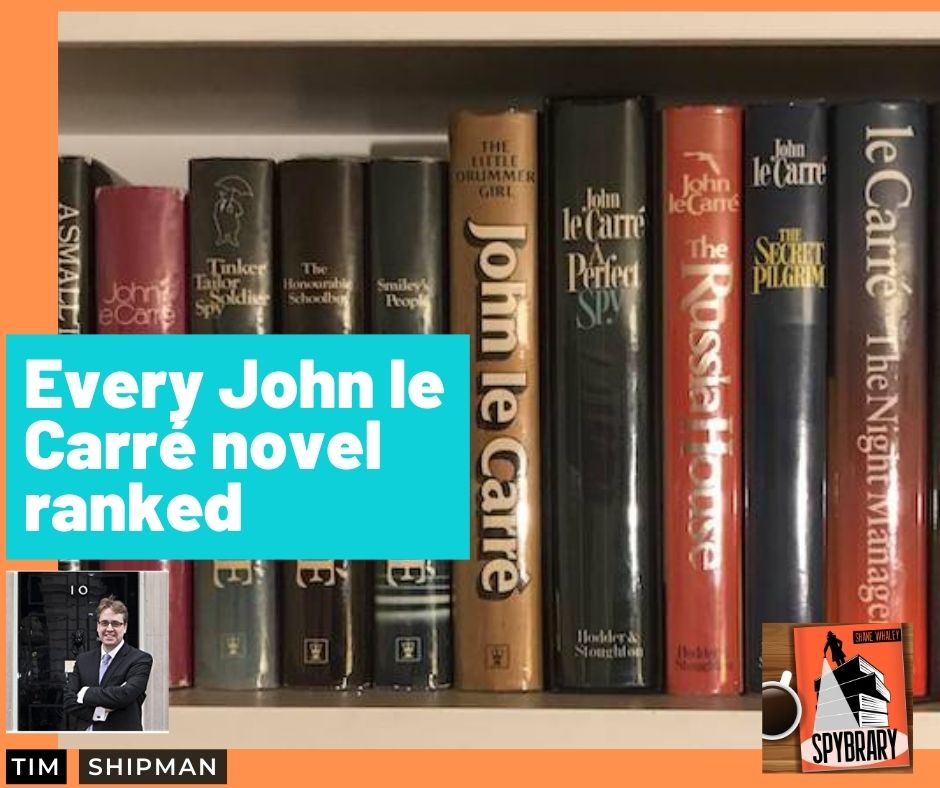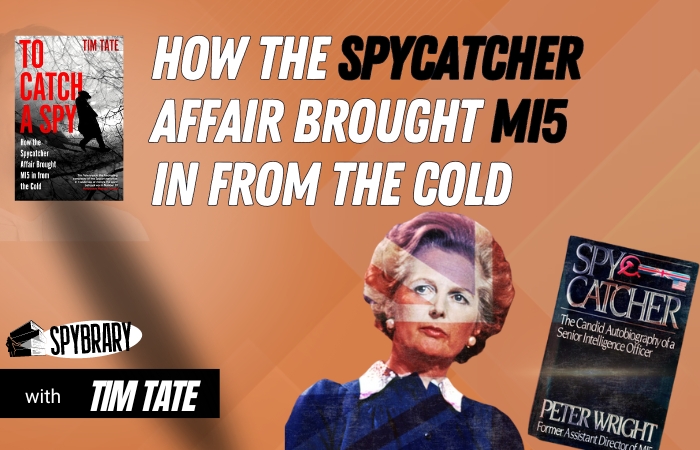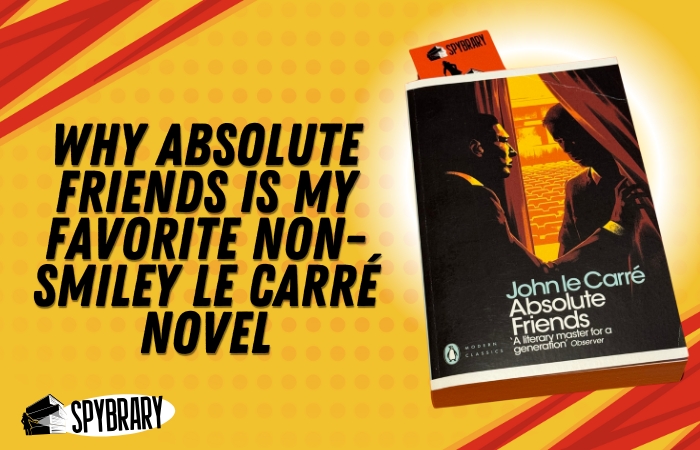
Enduring Friendships and Shifting Loyalties in John le Carré's Absolute Friends
Whenever I answer the question of which John le Carré novel ranks as my favorite (outside of the George Smiley series), my answer—Absolute Friends—often surprises.
With twenty-six novels in his collection, it’s the one that elicits jaw drops, eye rolls, or occasionally a knowing nod. Why? Absolute Friends is le Carré's “marmite” novel: readers either love it or hate it. I’m firmly in the love-it camp.
Here, I’ll delve into the themes that make Absolute Friends such an unforgettable read.
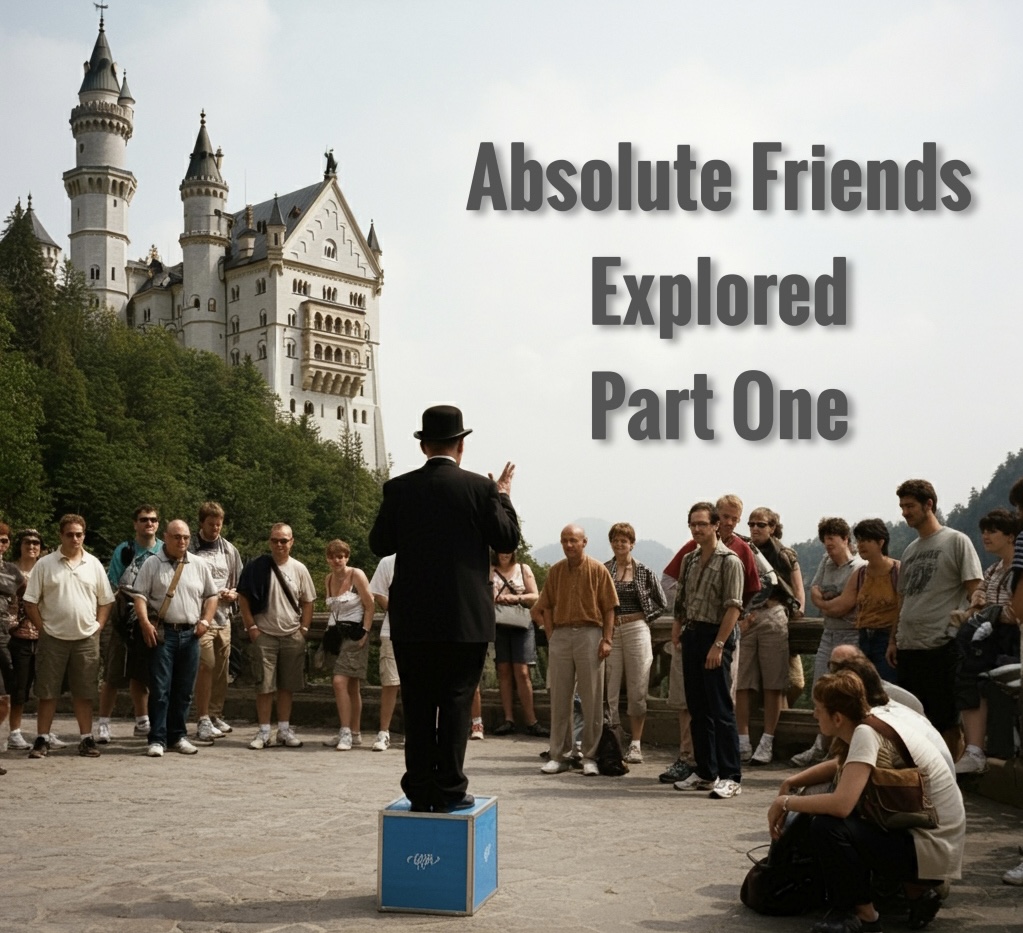
You can also hear me discuss why I love Absolute Friends on the epic Le Carré Cast with Jeff Quest.
‘ON THE DAY his destiny returned to claim him, Ted Mundy was sporting a bowler hat and balancing on a soapbox in one of Mad King Ludwig’s castles in Bavaria.'
John le Carré's Absolute Friends is an espionage novel set against the backdrop of the Cold War and its aftermath. Published in 2003, the book explores the complex relationship between Ted Mundy ‘Tour Guide', a former British Council officer, and Sasha, his former friend and comrade from their student activist days in 1960s Berlin.
The Complex Friendship of Ted Mundy and Sasha
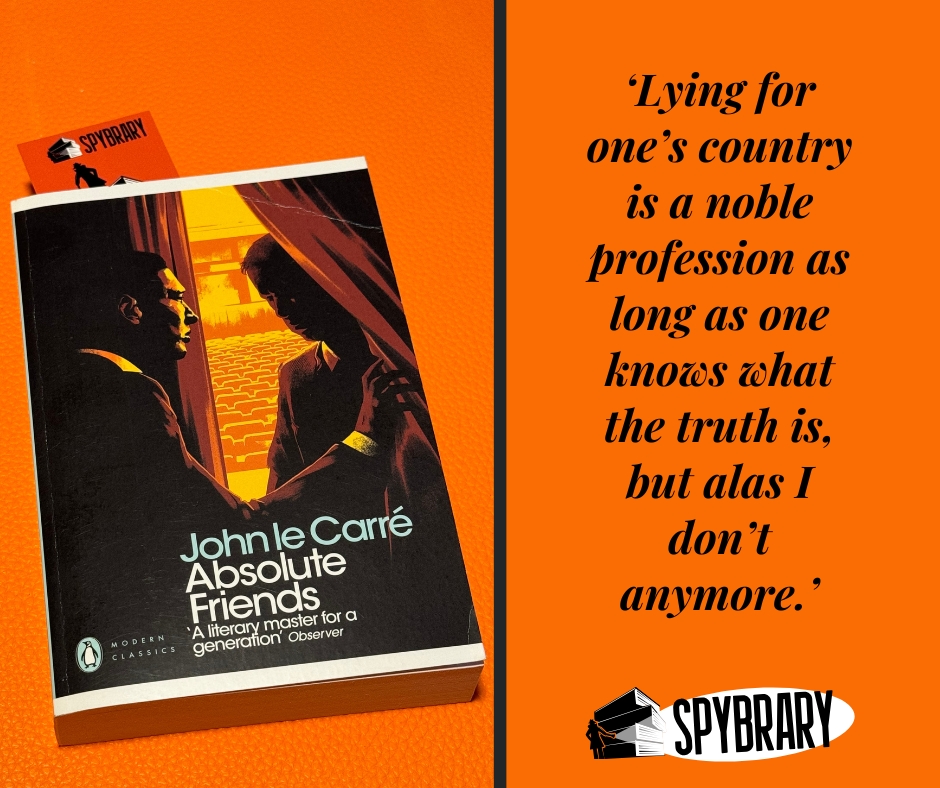
The heart of Absolute Friends lies in the tumultuous friendship between Ted and Sasha. Their bond, forged in the crucible of idealistic student activism in 1960s Berlin, endures through decades of shifting allegiances and moral compromises. Initially drawn together by their shared rebellious spirit, their paths diverge as they become entangled in the murky world of Cold War espionage.
“Teddy, I am without words. What you did for me—saving my life, no less—this was the gesture of a friend I do not deserve. How can I repay you? Nobody has ever performed such an absurd act of sacrifice on my behalf. You are English, and for you, all life is a silly accident. But I am German, and for me, if it has no logic it is meaningless.”
On a recent episode of the Spybrary Spy Book Podcast, John le Carré's son, the author Nick Harkaway said that:
“Absolute Friends has its own strand of heritage within the John le Carré canon. You have Our Game and Absolute Friends, and arguably Night Manager and Single and Single are kind of in that space as well. And I guess it's the perfect spy strand. They're sort of stories of one-on-one male friendships with these kind of incredible consequences.”
The Moral Ambiguity of Espionage
Absolute Friends masterfully blurs the lines between right and wrong, forcing readers to confront the ethical dilemmas of espionage. Both Ted and Sasha find themselves navigating a world where betrayal and deception are the norm. Ted, initially driven by a sense of disillusionment and a desire to escape a broken heart, stumbles into the world of espionage, ultimately becoming a somewhat reluctant participant in Cold War machinations.
Sasha, after defecting to East Germany, finds himself disillusioned by the hypocrisy of the communist regime, eventually becoming a double agent, stealing secrets for the West. The novel offers no easy answers, prompting readers to consider the justifications and consequences of the characters' actions.
Main Themes:
- Betrayal and Loyalty: This theme permeates the story, primarily through the complex relationship between Ted Mundy and Sasha. Their friendship, forged in the crucible of Cold War Berlin, is repeatedly tested as their paths diverge and converge, often with life-altering consequences. David Amory, Mundy's handler and recruiter, also struggles with the dilemmas of spying.
- The Search for Identity: Both Mundy and Sasha grapple with questions of identity. Mundy, born in India to British parents, feels like an outsider in England. Sasha, taken from his East German father at a young age, struggles to reconcile his past with his present. This search for belonging drives their actions and shapes their choices.
- The Enduring Legacy of the Past: The shadow of the Cold War, and particularly the ideological conflicts of the time, loom large over the characters. The book explores how these historical events continue to influence personal relationships and global power dynamics.
- The Morality of Espionage: The novel doesn't shy away from the moral ambiguity inherent in the world of espionage. Mundy's journey forces him to confront the ethical dilemmas of his profession, particularly as he grapples with the true nature of Dimitri's ‘Counter-University.'
- Ted Mundy: An unconventional protagonist, Mundy is a man of contradictions – a former radical turned language teacher and then tour guide, a loyal friend entangled in a web of espionage. He is deeply affected by his past, particularly his complex relationship with his father and his time with Sasha in Berlin.
‘And who do they think they’ve met, these punters—or Billies, as the British tour operators prefer to call them—if they think at all? Who is this Ted Mundy to them as a fleeting memory? A bit of a comedian, obviously. A failure at something—a professional English bloody fool in a bowler and a Union Jack, all things to all men and nothing to himself, fifty in the shade, nice enough chap, wouldn’t necessarily trust him with my daughter. And those vertical wrinkles above the eyebrows like fine slashes of a scalpel, could be anger, could be nightmares: Ted Mundy, tour guide.”
This quote paints a vivid picture of how Ted Mundy is perceived by others, highlighting his outward persona as a jester-like figure but also hinting at a deeper, more complex inner life.
‘His real enemy is his own good-heartedness and his inextinguishable need to belong.‘
This insightful observation cuts to the core of Ted Mundy’s character, revealing a vulnerability that both attracts him to others and makes him susceptible to manipulation. - Sasha: A charismatic and enigmatic figure, Sasha is a brilliant but deeply troubled individual. His past in East Germany and subsequent defection to the West have left him with a profound sense of rootlessness and anger. He is driven by a desire to challenge authority and fight injustice, even if it means resorting to extreme measures.
- Dimitri: The enigmatic benefactor of the Counter-University, Dimitri is a man of immense wealth and ambiguous morals. His motivations remain shrouded in secrecy, leaving Mundy to question the true nature of the organization he is asked to assist.
- David Amory: Nicholas Amory is a British intelligence officer who plays a pivotal role in Ted Mundy's. He acts as Mundy's handler and confidant throughout his career as a double agent, providing guidance, support, and occasional cryptic warnings. Towards the end of the book Amory begins to question his own loyalty to the service.
‘There’s a new Grand Design about in case you haven’t noticed, Edward. It’s called preemptive naïveté, and it rests on the assumption that everyone in the world would like to live in Dayton, Ohio, under one god, no prizes for guessing whose god that is.‘ - The Counter-University: This mysterious institution, funded by Dimitri, aims to disrupt the status quo by challenging corporate influence in academia. However, its true purpose and methods remain unclear, leaving both Mundy and the reader questioning its legitimacy.
- Did John le Carré's own life inspire Ted Mundy? Without doubt, there are elements of John le Carré's life in Absolute Friends.
For instance, Ted Mundy discovers his love for the German language under the tutelage of Dr Mandelbaum.
Could Dr Mandelbaum be Mr King?
In a 2017 Guardian article ‘Why We Should Learn German,' John le Carré wrote that he ‘began learning German at the age of 13, and I’m still trying to explain to myself why it was love at first sound. The answer must surely be: the excellence of my teacher. At an English public school not famed for its cultural generosity, Mr King was that rare thing: a kindly and intelligent man who, in the thick of the second world war, determinedly loved the Germany that he knew was still there somewhere.'
‘Rather than join the chorus of anti-German propaganda, he preferred, doggedly, to inspire his little class with the beauty of the language, and of its literature and culture. One day, he used to say, the real Germany will come back. And he was right. Because now it has.'
What other similarites can you spot? Let us know in the Spybrary Community. - The Role of Anarchy and Communes in 1960s Berlin. Mundy finds himself living in an anarchist Berlin commune. John le Carré draws on his experiences visiting Berlin as an Intelligence Office in the early 1960s. Life in a Kreuzberg commune during the 1960s is accurately characterized in Absolute Friends by a rejection of traditional societal norms and an embrace of alternative lifestyles.
Communal living involved shared resources, collective decision-making, and a blurring of personal boundaries. For example, Mundy learns that personal privacy is seen as a “bourgeois barrier to communal integration,” with even bathroom facilities being shared. - The Role of Espionage: The novel portrays espionage as a pervasive force that permeates every aspect of the characters' lives. From the Cold War battlefields of Berlin to the seemingly peaceful streets of Heidelberg, Mundy finds himself constantly navigating a world of secrets, lies, and betrayals.
Tim Shipman, the Sunday Times Political Correspondent and spy fan, ranks every John le Carré novel for Spybrary.
Key Quotes:
On the moral dilemma of espionage: ‘Wondering whether what he did was worth a busted marriage and a busted career and a child I daren’t look in the eye. Would you do it all again tomorrow, Daddy, if the bugle sounded? Irrelevant. There isn’t a tomorrow. Not one like yesterday.'
and
‘Lying for one’s country is a noble profession as long as one knows what the truth is, but alas I don’t anymore.'
This poignant statement reveals a growing disillusionment with espionage and a loss of faith in the justifications for deception, suggesting a moral awakening.' This quote underscores the personal cost and moral compromises inherent in a life of espionage.
The Opening Line. ‘On the day his destiny returned to claim him, Ted Mundy was sporting a bowler hat and balancing on a soapbox in one of Mad King Ludwig’s castles in Bavaria.'
This opening line of Absolute Friends sets the stage for Ted Mundy's character. The contrast between the mundane (a bowler hat) and the extraordinary (a Bavarian castle) hints at the blend of ordinariness and intrigue that defines Mundy's life. The phrase “destiny returned to claim him” foreshadows the reappearance of Sasha, who will draw Mundy back into the world of espionage and fundamentally alter the course of his life.
On the nature of Sasha and Mundy's friendship: “Sasha's the boomerang you can't throw away. A couple more minutes and he'll be banging on the door, telling me I’m an arsehole and kindly pour him another Scotch, and I’ll pour myself another while I’m about it.” This quote highlights the addictive and inescapable nature of their bond, despite its turbulent history.
On Ted Mundy's various identities at the different stages of his life. “A Bolshie ex-schoolboy and ex-Oxford leftist-turned-anarchist dropout and Berlin rowdy who, after a well-merited beating, was run out of town at crack of dawn; an unqualified prep-school master expelled for venery who fell foul of a provincial newspaper before setting up as a failed writer in New Mexico, only to creep back to England and lose himself in the no-hope basements of the arts bureaucracy, a has-been to his grubby fingertips.”
This is a masterful encapsulation of Ted Mundy’s many failed endeavors and shifting identities, culminating in a sense of disillusionment and aimlessness.
On the power of the past: “Shut out your past at the front door, and it creeps in at the back.” This quote underscores the inescapable influence of past experiences on the present.
On Sasha's internal conflict: “By keeping my name Sasha, I was able to demonstrate to myself that I had left my heart in the East.” This quote reveals Sasha's lingering attachment to his past and his struggle to forge a new identity
Why Ted Mundy is the perfect double agent. “Of course you didn’t join the Party! Why should you? You didn’t want to imperil your career. But your tutor was a Red, your first girlfriend is a Red, you’re a member of the St. Pancras Labor Party, which is good and left, you’re married to a woman of left-wing lineage whose father was a full-blown comrade till he lapsed in ’56. You’re a miracle, dear boy! If we’d had to invent you, you wouldn’t be half as convincing. You’ll be God’s gift to them. As, I have to say, you are to all of us.”
This reveals the cynical manipulation of Ted Mundy's past to create a convincing cover for his role as a double agent. It highlights the blurred lines between truth and fabrication in the world of espionage.
Ted Mundy's Motivation for Spying. ‘I’m doing this so that our unborn child and other people’s unborn children will be able to sleep at night, he tells himself with one voice.
This exposes the internal conflict within Mundy. He tries to justify his actions as serving a greater good, but the phrase “one voice” suggests a growing dissonance and lack of conviction.
John le Carré's Use of Sex as a Metaphor for Spying ‘A classic Cold War double-agent operation is taking its first cautious steps towards consummation. If the seduction is agonizingly slow, that is because Ted Mundy in his many parts turns out to be a master of prevarication.'
This underscores Mundy's natural skill as a double agent. His ability to prevaricate and maintain multiple personas is crucial to his success in the shadowy world of espionage.
Absolute Friends is Very Political. You have been warned. ‘The liberal left will be exposed as the closet fascist bastards they’ve always been, and the petit bourgeoisie of Europe will go crawling to its American Big Brother, begging it to come to its protection.'
This chilling prediction, spoken by a character representing a right-wing, pro-American perspective, reveals the cynical calculations and manipulations at play on the global political stage. It suggests a future where fear and the erosion of individual liberties become tools of power and control.
On Dimitri's motivations: “I am speaking of the deliberate corruption of young minds at their most formative stage… I am speaking of the encroachment of corporate power on every university campus.” This quote, while seemingly idealistic, highlights the potential for manipulation and the ambiguity of Dimitri's intentions.
But
It would be remiss of me not to point out the ‘strident editorialising' in the novel. Absolute Friends is political and John le Carré is furious with Blair and Bush over Iraq and the allegations that Saddam Hussein possessed weapons of mass destruction. Many John le Carré fans struggle with the rage that seeps through Absolute Friends, especially its finale. The politics did not bother me, though that abrupt ending…not many books have brought me to tears but this one did. So you have been warned, simply put, neo-cons, you will hate this book.
Conclusion
Absolute Friends is a multifaceted novel that grapples with the complexities of friendship, loyalty, and betrayal set against the backdrop of Cold War intrigue and its lingering effects. Le Carré's masterful storytelling, his deft portrayal of morally ambiguous characters, and his insightful exploration of enduring themes make this book a compelling read that continues to resonate in the 21st century.
What is your favourite John le Carré novel? Let us know in the Spybrary community
Amazon links in this report may earn Spybrary a small commission.
Join the Spy Book Podcast Community Discussion
Spybrary is more than just a spy podcast; it's a place to chat with fellow spy book and spy film fans from around the world. We encourage you to share your views on each spy book/movie, engage in discussion with fellow fans, and immerse yourself in the captivating world of spy fiction, spy fact and spy films.
